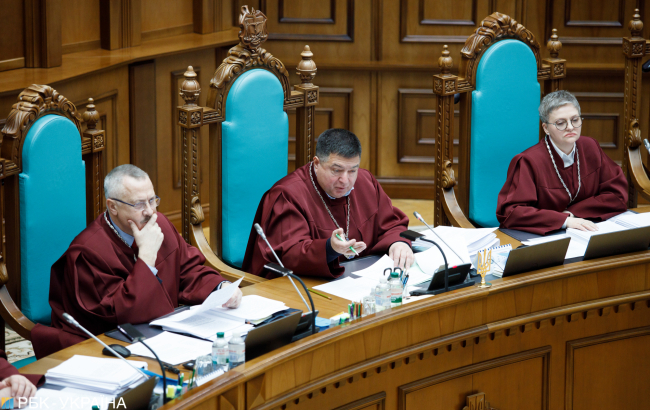Later, when the president’s party showed signs of division, it became obvious that not all Servant of the People MPs were ready to line up unquestionably behind the president.
Read also: The rebellion: Servant of the People MPs unexpectedly reject president’s law, but for how long?
Within the mix of disparate views, certain new anti-corruption initiatives that had already gained the support of Parliament got lost in the agenda. However, that doesn’t make them less important. For some of these, anti-corruption activists have been fighting for years.
Unblocking the Anti-Corruption Court
The National Anti-Corruption Bureau (NABU), the Specialized Anti-Corruption Prosecutor’s Office (SAPO), and the system for public procurement ProZorro were the first anti-corruption initiatives launched by the previous government. Whereas the role of ProZorro is clear -- to make procurement procedures transparent - the purpose of NABU and SAPO has often been confusing for Ukrainians.
Their role is to investigate top-corruption cases, yet they have been constantly questioned as to why corrupt individuals were not being convicted. In fact, it is the courts that are responsible for the imprisonment of corrupt individuals whose cases NABU and SAPO had investigated. The courts, however, have been tardy in dealing with top-level corruption cases, and this is where the delay for sentencing can be attributed.
Read also: Overloaded Ukrainian courts obstructing justice in top corruption cases
To remedy the backlog, Ukrainian NGOs advocating for anti-corruption reform created a special court to deal with top-level corruption. Ukraine’s Western partners supported the initiative, having spent three years pressing the previous government to take action. In March 2019, the 38 judges selected to the High Anti-Corruption Court (HACC) were named. The selection process took place with the participation of the Public Council of International Experts. The composition of the new court judges was condoned by civil society organizations.
The following month, then-President Petro Poroshenko appointed the judges. As the HACC did not start working immediately, the top-level corruption cases were still considered in ordinary courts. Some at high speed causing suspicions among the representatives of anti-corruption NGOs that the courts are aimed to help corrupts to avoid justice in the HACC.
“For me, its greatest value is that some anti-corruption cases are already starting to be considered at lightning speed by the court. It suggests that not only civil society believes in the independence of the Anti-Corruption Court, but people who are already sitting in the docks are afraid of trials with the newly elected judges,” said Iryna Shyba, executive director of the DEJURE Foundation, civil society organizations actively involved in judicial reform.
Read also: Highly anticipated Anti-Corruption Court prepares for launch in three months
On 5 September 2019, the new court got underway. However, it faced problems from the start - one that threatened its effectiveness altogether. They were getting totally overloaded. Apart from the 200 cases investigated by the NABU, already waiting to be heard, the 38 judges of the new court were about to be inundated by 3,000 more cases under investigation by other law enforcement agencies.
Such a burden would take years to complete. The situation could have been addressed through a simple legislative move. But none was forthcoming.
The upshot is that the anti-corruption court will consider the 200 cases of NABU and SAPO, and the regular courts will consider the cases of the other agencies. The first verdicts of the anti-corruption court are expected until 2020.
Even with the passing of the bill, there are early signs that corrupt justices will not readily refer top-level cases to the new Anti-Corruption Court.
For example, on 20 September a hearing on the case of ex-MP Mykola Martynenko who was accused of embezzling Ukrainian state enterprises in the amount of about UAH 700mn ($27.8mn), took place at an ordinary court. According to the new law, the case should have been directed to the Anti-Corruption Court. No less than three judges refused to do so. Instead, they directed the case to the Kyiv Court of Appeal, where it would later be directed to the Supreme Court — thus ensuring a protracted trial without penalty to Martynenko for several years.
Experts of the Anti-Corruption Action Centre, the leading NGO in anti-corruption reform, considered the step as a violation of the law.
Martynenko's case was not the only one that the Shevchenkivskyi District Court of Kyiv failed to direct to the Anti-Corruption Court. The same deviation was used in the case of Roman Nasirov, ex-head of the State Fiscal Service, who was accused of causing damage to the state in more than UAH 2 bn ($73.7mn).
Read also: Court reinstates Ukraine’s highest-profile corruption suspect as Fiscal Service chief
More transparency for public procurement
The name of the procurement system ProZorro appears to be a pun since it translates from Ukrainian as “transparent.” The system indeed revolutionized procurement procedures in Ukraine, making them far more transparent.
In 2017, the majority of experts leading the coalition of the Reanimation Package of Reforms recognized the introduction of the ProZorro procurement system as one of the greatest successes of reform implementation.
ProZorro served as a calling card for Ukraine. It was an example of real reform conducted upwards - the combined forces of business, government, and civil society supporting a healthy ecosystem for public procurement.
Still, after four years, it was clear the system needed improvement. Civil society experts had been advocating for a new law for at least two years.
The bill finally came before parliament on 19 September and was passed as new legislation. Artem Romaniukov, head of the board of NGO Platform Public Control, called it a silent revolution for procurement.
The new legislation reduces the limit for obligatory procurement through ProZorro from UAH 200,000 ($7,950) to 50,000 ($1,987). It is also expected that some 250,000 procedures per year will be brought to light. As a result, additional savings would add up to UAH 9bn ($361,584) per year. The novation comes into force six months after the passing of the bill.
Relaunch of the National Agency on Corruption Prevention and wiretap for NABU
Another outcome of the previous government's anti-corruption reform was the creation of an additional institution - the National Agency on Corruption Prevention (NACP). Its role is to verify state officials’ declarations of assets and to reveal any instances of corruption or abuse of power.
However, since the very beginning of its work, NACP was not well received and was soon implicated in corruption scandals. Poor management has mainly been faulted.
The new head is to be elected by a commission of six people, three of whom need to be international experts.
“The parliament implemented its duty, and now the fate of the agency and the verification of the declarations of the authorities depends on the government and the competition commission,” Olena Shcherba, member of the board of the Anti-Corruption Centre NGO, later said.
Anti-corruption NGOs have been advocating for these provisions for at least three years. During that time, the SBU heads were involved in numerous scandals. For example, journalists revealed that Serhiy Semochko, the previous first deputy head of the External Intelligence Services, owned real estate amounting to $8mn. Pavlo Demchyna, ex-head of the SBU, was also hiding assets and became a target for the NABU investigation.
Read more:
- Here is how Ukraine can finally prosecute top-corrupt officials
- 5 months after legal start of Anti-Corruption Court, how close is Ukraine to prosecuting its top-corrupts?
- Punishment or well-designed institutions: what will eliminate corruption in Ukraine?
- The Court – Euromaidan Press documentary on the creation of the Anti-Corruption Court
- Poroshenko’s judicial reform is over, long live Zelenskyy’s judical reform
- Punishment or well-designed institutions: what will eliminate corruption in Ukraine?
- The ups and downs of Ukraine’s fight against corruption
- The Court – Euromaidan Press documentary on the creation of the Anti-Corruption Court (2018)

![Anti-corruption steps of Ukraine's new parliament endorsed by activists [fight corruption]](https://euromaidanpress.com/wp-content/uploads/2019/10/антикор2019-1.jpg)



